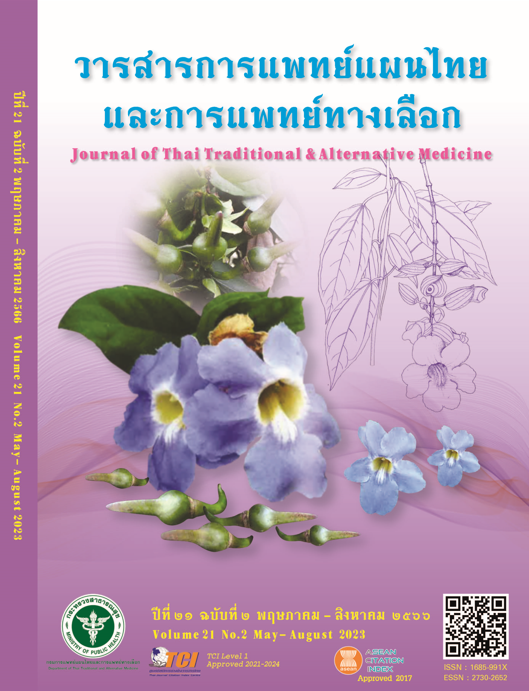Traditional Food Culture for Elderly Health Promotion in Wiang Tha Kan and Yuwa Communities, San Pa Tong District, Chiang Mai Province
Main Article Content
Abstract
Introduction and objective: Traditional food culture promotes the health of the elderly through a combination of local wisdom and lifestyle. The purposes of this research were to (1) explore traditional food culture and (2) synthesize traditional food guidelines for elderly health promotion.
Methods: This mixed methods research involved 295 elderly persons and 18 stakeholders in Wiang Tha Kan and Yuwa communities in Chiang Mai’s San Pa Tong district. Data were collected using a questionnaire, informal interviews and focus group discussions, and were then analyzed with descriptive statistics and content analysis.
Results: The traditional food culture for older persons included food preparation, raw material source seeking, cooking process, food-set arrangement, and food serving. The total mean score for traditional food culture was at a moderate level (3.46 ± 0.80). In addition, the stakeholders have suggested that, to incorporate traditional food culture into health promotion for elders, the community and relevant agencies should create and develop fresh food production areas, and promote food product development and local consumption for elderly persons.
Discussion: Traditional food culture is important for health promotion of the elderly, especially kaeng (soup) and nam phrik (chilli sauce) recipes. This option exists and operates based on community food resources diversity, beliefs and faith.
Conclusion and recommendations: The total average score of food culture for the elderly was at a moderate level. In this regard, technical and funding support should be provided for improving academic and learning resources, and creating participation process and guidelines for enhancing the utilization of food resources in the community.
Article Details

This work is licensed under a Creative Commons Attribution-NonCommercial-NoDerivatives 4.0 International License.
References
Kathy D. Elder abuse in context of poverty and deprivation and emergency department care. Australasian Emergency Nursing Journal. 2007;10(4):169– 77.
Reddy G, Dam RM. Food, culture, and identity in multicultural societies: Insights from Singapore. Appetite. 2020;149:104633.
Ahlawat M, Gautam PK. Reunifying our traditional values and culture through slow food: A case study of Punjab. Nat Volatiles & Essent Oils. 2021;8(5):10980–8.
Jaitae S. The lanna health cultural for health care. Thammasat Medical Journal. 2018;18(2):240–8. (in Thai)
Jaitae S. Predictive factors of lanna local-food consumption behavior among the elderly in Suthep sub - district municipality, Muang Chiangmai district, Chiangmai province. Hatyai Academic Journal. 2020;18(1):103-15. (in Thai)
Pruksa S, Sripoona S. Healthy food consumption behaviors of elderly in Na-o sub-district, Muang district, Loei province. Research and Development Journal, Loei Rajabhat University. 2017;12(42):57-67. (in Thai)
Egkantrong P, Banjong O, Boonpraderm A, Charoonruk G. Developing local recipes for the elderly. Journal of Health Systems Research. 2010;4(2):249-56. (in Thai)
Khamluang P, Sumpowthong K. Wisdoms related to local vegetable consumption for health purposes in Sisaket subdistrict, Na Noi district, Nan province. Thammasat Medical Journal. 2019;19(1):90–8. (in Thai)
Suksritong N. Lana local wisdom for health promotion of elderly in Saluang subdistrict administative organization, Mae Rim district, Chiang Mai province. Christain University of Thailand Journal. 2017;23(2):164-73. (in Thai)
Pangsiri M. The development of the model in health promotion to the senior citizens by the local wisdom and community participation of Banklang municipality, Banklang subdistrict, Sanpatong district, Chiang Mai province. Rajabhat Chiang Mai Research Journal. 2015;16(2):87-96.(in Thai)
Saiwichian P. Food culture and health. Chiang Mai: Nopburee Press Company Printing; 2004. (in Thai)
Joshi A, Kale S, Chandel S, Pal DK. Likert scale: explored and explained. British Journal of Applied Science and Technology.2015;7(4):396–403.
Cronbach LJ. Coefficient alpha and the internal structure of tests. Psychometrika. 1951;16:297–334.
Daniel WW. Biostatistics: basic concepts and methodology for the health sciences (9th ed.). New York: John Wiley & Sons; 2010.
Morse J, Field P. Nursing research: the application of qualitative approaches. London: Chapman and Hall; 1996.
Kumkong M, Suwanaraj M, Saetiew S. Food and nutritional management model for older adults using the mother’s food guideline: A case study of the elderly club, Boromarajonani college of nursing Songkhla. The Southern College Network Journal of Nursing and Public Health. 2018;5(3):53– 68. (in Thai)
Aromkliang T, Chatraphorn S. Sustainability of local wisdom transferring on lanna food. Kasetsart Journal of Social Sciences. 2014;35(2):189–205. (in Thai)
Suwanapha C, Woowong O, Suphameteesakul S. Local food: The management process for the quality of life and social ethics in northern communities. Journal of MCU Peace Studies. 2018;6(4):1306-19. (in Thai)


